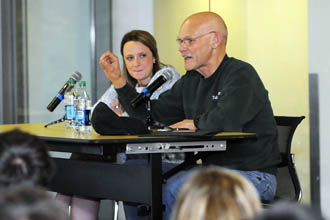Will 'Obamacare' reap better health, cost savings?

During a forum about the Affordable Care Act, James Carville and Mollye Demosthenidy said healthcare reform is a work in progress. (Photos by Cheryl Gerber)
Carville, a professor of practice in political science, and Demosthenidy, a clinical assistant professor of global health systems and development, opened with a discussion of the healthcare and insurance landscape, and how it has changed under the ACA.
Demosthenidy framed the goals of any healthcare reform as making improvements in the cost, access and quality of health care. The ACA, Demosthenidy said, has had the most success in increasing access, but achieving cost reductions will be a challenge.
Carville, a former strategist for President Bill Clinton, described the challenges that the Clinton administration encountered in its attempts to enact healthcare reform, and highlighted the different substantive and political approaches that the Obama administration and Congress took in 2009.

The discussion of healthcare reform draws an overflow crowd to the Qatar Ballroom in the Lavin-Bernick Center.
Demosthenidy discussed the legal and legislative challenges to the ACA, such as the Supreme Court ruling on the ACA's individual mandate and states' efforts to limit their participation in the ACA.
Responding to questions about the law's effect on public health education and research, Demosthenidy said the ACA raises important questions about how schools and hospitals can increase the availability of preventive care options and lower costs for patients.
She concluded the discussion by noting that educators must be innovative and prepare students for what healthcare practice will look like in 20 years, not today.
The event was part of the celebration of National Public Health Week at Tulane University.Alex Chasick, a freelance writer living in New Orleans, is a 2005 graduate of Tulane University.
